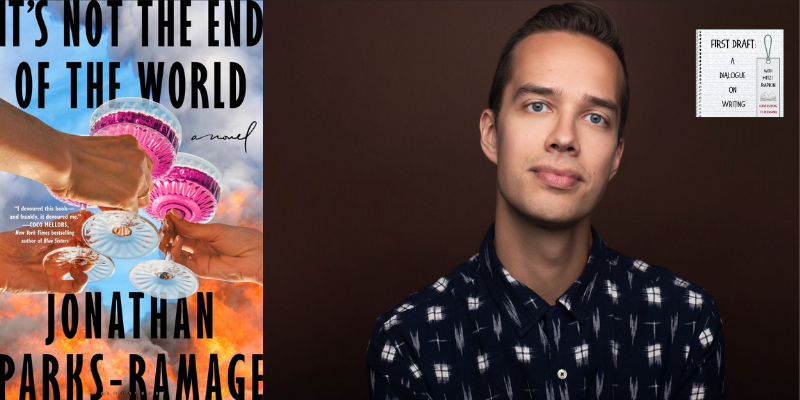
Jonathan Parks-Ramage on Inventing the Future
In Conversation with Mitzi Rapkin on the First Draft Podcast
First Draft: A Dialogue of Writing is a weekly show featuring in-depth interviews with fiction, nonfiction, essay writers, and poets, highlighting the voices of writers as they discuss their work, their craft, and the literary arts. Hosted by Mitzi Rapkin, First Draft celebrates creative writing and the individuals who are dedicated to bringing their carefully chosen words to print as well as the impact writers have on the world we live in.
In this episode, Mitzi talks to Jonathan Parks-Ramage about his new novel, It’s Not the End of the World.
Subscribe and download the episode, wherever you get your podcasts!
From the episode:
Mitzi Rapkin: I want to ask you if you could describe a little bit about the political situation in your novel. There are a few major themes with politics or things that are important in your characters’ world. One is the Anti-American Speech Committee. Another one is the octo liberals. Could you explain those?
Jonathan Parks-Ramage: Margaret Atwood has a rule, and I can’t remember the exact quote, but essentially, her idea is that when imagining the future and future dystopias, she never invents something out of the blue. She’s always looking towards history because history inevitably repeats itself and using history to inform what the future might look like. So, for me, that was the creation of the Anti-American Speech Committee, which is a government panel essentially designed to prosecute artists for holding views or creating work that resists basically the fascist state that has overtaken the American government. So, for me as an artist, I think this was kind of like an existential thing that I was struggling with. And certainly, you know, it’s not cute out there right now, ladies and gents. It has become, unfortunately, more relevant. But I think that there is also hope to be found in looking towards the past to create the future because what you realize in that is that there have always been oppressive forces. There have always been fascist forces, there have always been people who are just terrible in the American government, but at the same time, there are always people who have resisted, and there are always people who have still found ways to create joy, to create life, to create art, despite these. So, for me, in having, you know, two artists as protagonists, it was important to kind of imagine how their lives might be impacted by what I see as kind of the arc towards extremely curtailed speech. So that was kind of the decision behind creating the Anti-American Speech committee because I wanted to also examine the power of art and the lack of power of art and the possibility for art to be empty if it adheres or obeys fascism. Mason, my character, really struggles with that. I mean, he starts the novel basically as a sellout. He started his career as this wild kind of counter cultural force, but then started giant lobby installations for huge banks, and has become very wealthy doing this but feels like he is empty inside. So, I feel like that also is something that the challenge of making counter cultural art in the context of fascism is something that was important for me to depict and also just something that’s on my goddamn mind. And then the octo-liberals, basically the American right has basically fabulated this force of octopus human hybrids that they imagine the far left to be, which has resulted in the mass murder of octopi across the nation’s shores. But also, I wanted to just push the conspiracy theories just a little bit further. Part of the popularization of the octo liberals was a movie called Tentacles, starring Chris Pratt as like a grizzled marine biologist who’s fighting these evil octopus hybrids.
***
Jonathan Parks-Ramage is a novelist, playwright, screenwriter and journalist. He is also the author of the novel Yes, Daddy named one of the best queer books of 2021 by Entertainment Weekly, NBC News, The Advocate, Lambda Literary, Bustle, Goodreads and more. He is the Co-Creator of the Big Gay Jamboree, an Off-Broadway musical, nominated for five Lucille Lor-tell Awards, three Outer Critics Circle Awards, and four Drama Desk Awards. His new book It’s Not the End of the World was selected by The New York Times Style Magazine as a pick for Best Queer Summer Fiction.
First Draft: A Dialogue on Writing
First Draft: A Dialogue on Writing is a literary podcast produced and hosted by Mitzi Rapkin. Each episode features an in-depth interview with a fiction, non-fiction, essay, or poetry writer. The show is equal parts investigation into the craft of writing and conversation about the topics of an author’s work.



















